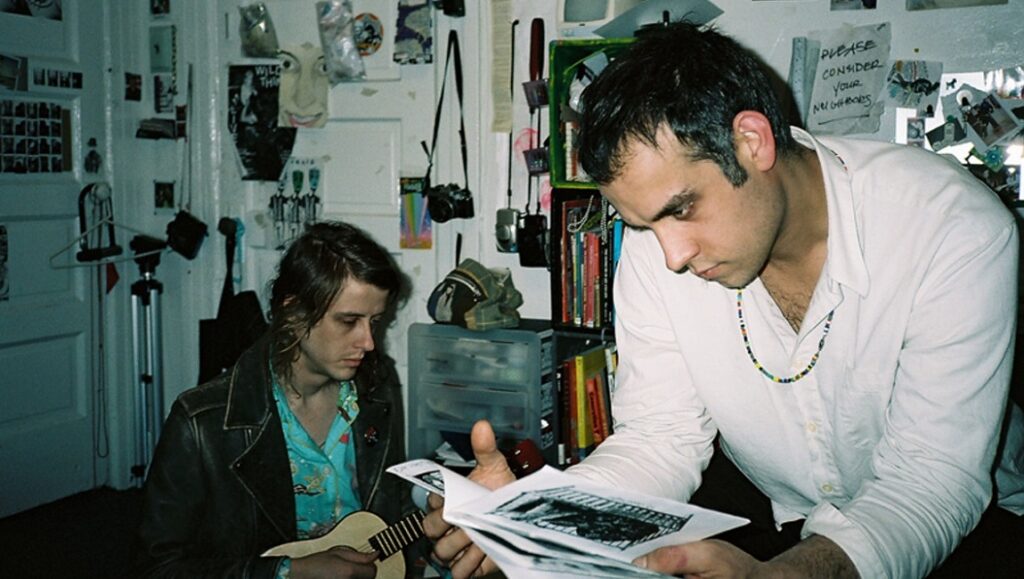JR White passed away on October 18, 2020, at the age of 40, leaving behind a special body of work as a producer/engineer, and one-half of the short-lived, much beloved, cult indie rock act, Girls. White hadn’t been associated with a publicly-released project since Tobias Jesso Jr.’s (still excellent) 2015 debut Goon, an album he agreed to produce in the immediate aftermath of Girls’ shocking break up. Lasting about seven years during which 2 albums and an EP were released, there was good reason to believe that the band was bound for something major; their 2011 album Father, Son, Holy Ghost was assumed to be a leaping off point, the album that would set them up to do whatever they wanted. But, of course, after a year of touring and festival dates, the band’s other half, vocalist and songwriter Christopher Owens, took to Twitter to announce that he was moving on to solo projects. Girls would be no more.
Alas, this announcement hardly read as triumphant; not some declaration of artistic integrity, but a murky, anticlimactic ending to a creative union that still seemed alive and energized. Owens made good on his promise of solo projects, releasing three fine enough albums under his own name from 2013-2015, but his songs never fared as well as they did when White was involved with the recording. And similarly, White seemed at a loss without Owens, overwhelmed by a visibility (and influx of job offers) he never anticipated following the band’s break up, and nonplussed by his friend and bandmate’s decision to bring their project to a close so unceremoniously. But while Owens was the one to actively pursue an exit from the band, White would go on to admit that he didn’t offer much push back; the sessions that resulted in Father, Son, Holy Ghost offered a stark, negative contrast to those that had grown into their 2009 album, Album.
The specifics of what exactly happened during the recording of Father, Son, Holy Ghost remain vague and are, probably, frustratingly mundane, but whatever transpired brought about a communication breakdown in the studio, the album finished with Owens and White no longer speaking to each other. The early days had been different of course. Girls was not just a band, it was their relationship performed for us and articulated in their music. This was wonderfully evident on Album, a project that was born out of a profound intimacy, the duo working on it for two years, during which time they were almost never apart by White’s own estimation. The music that makes up Album is a testament to that intimacy, most obviously manifested in Owens’ lyrical content which generally played around somewhere between self-deprecation and flagellation. “Honest” and “raw” were common descriptors for Girls’ music, and no doubt both were fine wrapping this up into their image, speaking plainly about their fraught relationship with drugs when asked in interviews, with Owens’ story in particular — raised in a cult from which he eventually escaped — becoming a favorite of music journalists. Yet, it was hard to read disingenuousness into their project because the music was undeniable — Owens’ songs somehow both unvain and utterly transcendent, while White cultivated a space in which they could be fully performed, stitching eclectic ideas into a seamless production.
Album isn’t really content to stay in any one genre or mode, adapting its aesthetic approach as Owens shifts through variations of himself, flaunting his vulnerabilities while reaching for some sort of redemption. Unashamed of ambition, Album opens on a track titled “Lust For Life,” a sunny, garage-y bop marked by the sharp whine of Owens’ vocals and the words that commence the album: “Oh, I wish I had a boyfriend / I wish I had a loving man in my life / I wish had a father / And maybe then I would’ve turned out right”. But Girls never let such moments of bald anguish hang unchallenged, complicating them with borderline arch melodic juxtapositions and even song sequencing (track 2, “Laura”, finds Owens’ harmonizing/commiserating with himself over a relationship gone toxic with the song’s namesake). As written, these songs snap at and recoil from the audience, yelping out anguished reproaches before pulling back into disarming naïveté. The album plays out similarly, shifting from catchy pop to drawn-out ballad, letting the massive energies at play expand and contract, climaxing midway with the seven-minute anthem “Hellhole Ratrace.” And it’s this song that cements Album as a work beyond, a transcendent moment that breaks free from the established tension and crests into tender, clear-eyed optimism that colors the tracks that follow: “But I don’t want to cry my whole life through / Yea I wanna do some laughing too.” It’s not difficult to see the bad version of this album when you look closely, the sort of bratty L.A. garage rock that Burger Records peddled perhaps. But Girls had JR White, and through his vision, Christopher Owens’ eclectic musical compositions were rendered, however briefly, into something whole and brilliant in their sincerity.
Part of Kicking the Canon – The Album Canon.


Comments are closed.